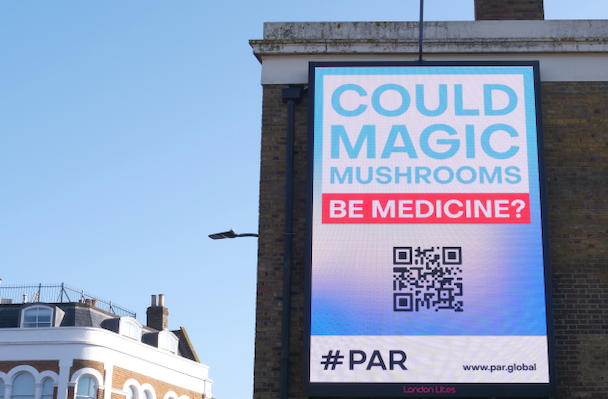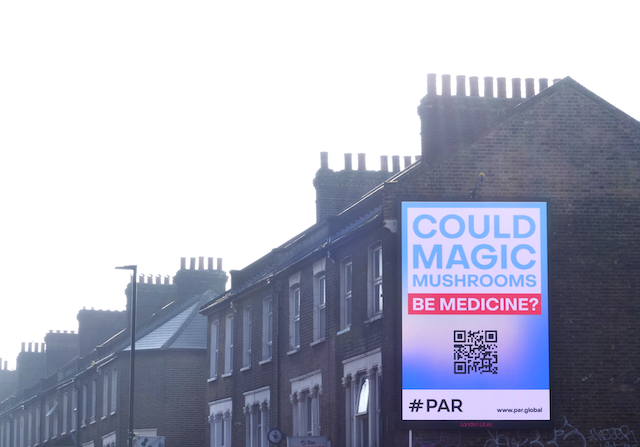Meet the ad exec turned ‘psychedelic evangelist’ fighting to advertise drugs
The Drum sits down with Tara Austin, the Ogilvy behavioral science leader turned ‘psychedelic evangelist’ lobbying to change the UK's approach to magic mushrooms.

PAR's Tara Austin on the campaign to 'reschedule' magic mushrooms and her own journey as an adland activist / Image courtesy of PAR
An international movement to shift perspectives on the medicinal capabilities of psychedelics, like psilocybin, a psychoactive compound found in the group of fungi known as magic mushrooms, is gaining momentum.
It’s not a new movement, but the legal wins are. In January, Portland, Oregon began a program of supervised use; just this month, Australia announced that it will allow the prescription of psilocybin and other substances for select conditions.
In the UK, a digital billboard campaign is garnering attention in the national press. The campaign, from pressure group Psilocybin Access Rights (PAR), centers around the question: ‘Could magic mushrooms be medicine?’
Behind the campaign is ad exec and behavioral science leader Tara Austin, a partner at Ogilvy. Talking to The Drum, Austin charted the campaign’s course and her own evolution as an adland activist.
Advertisement
A new schedule
PAR’s campaign is the first UK campaign focused on psychedelics in particular. The closest is drugs charity Release’s ‘Nice People Take Drugs’, back in 2009.
Getting the campaign live, Austin says, was not easy. “For more than a year we struggled to get media owners to take us seriously and we were continually knocked back,” she says. Eventually, though, PAR was able to find partners to work on the campaign pro bono: design agency NewTerritory; media agency BBJ&K and digital screen providers London Lites.
A PR and out-of-home approach draws on Austin’s behavior change background. “From a behavioral science perspective, OOH and PR/print together have a powerful effect on ‘emerging norms’,” says Austin. The target is eyeballs: “We talk a lot about the ‘mere exposure effect’. The number of times that people see this stuff really matters.”
The campaign focuses on ‘rescheduling’ psilocybin from ‘schedule one’ to ‘schedule two’. Its existing designation, the campaign argues, makes it hard for researchers to get hold of, gagging scientific progress and preventing access to medicines that could save lives.
“There are a lot of people in our society that we just write off: we say they’re too troubled, too traumatized, too addicted; there's nothing that can be done to save them,” says Austin. “For those people, these medicines really do represent hope.”
Austin goes on: “I’ve seen miracles happen with these medicines. It's wrong that I’m in an elite that knows about this; everybody deserves to know. We need to change the regulation to make these medicines medically accessible, and for more research to happen.”
Advertisement
An adland activist
Austin’s advertising credentials include planning and strategy roles for the likes of Publicis, leading to a partner position in Ogilvy’s behavioral science practice. She still works at Ogilvy four days a week, devoting the remainder of her time to the PAR project. But how and why has she taken on such a high-profile activist role outside her day job?
The ‘why’ for Austin is easy: “I’m convinced this is going to change the world”. She compares what she sees as psychedelics’ paradigm-shifting potentialities to the contraceptive pill or vaccinations: “This is our generation’s penicillin moment – which is also a fungus, of course.”

The ‘how’ is a more complicated journey that includes an ayahuasca ceremony and a pivotal moment at 10 Downing Street’s cabinet room.
First, the ayahuasca ceremony: during what Austin describes as “a (fortunately) very brief period of depression,” she took the advice that a guided psychedelic experience could alleviate her condition. “People don't like the word ‘cure’, but it cured me. I've never needed to be treated for depression again (and I was spending a fortune on therapy). I was healed of the thing that was ailing me in one in one dose, in one night. That made me very evangelical about the opportunity for these medicines for other people.”
(Despite this powerful personal experience, Austin urges caution: the psychedelic community is aware of the dangers of “hype”: teasing radical effects to people who are suffering acutely can encourage rash action.
“They require guidance and stewardship, these medicines. We need to be careful with them. They’re very powerful, and they can traumatize people. They can cause harm if used incorrectly. But they are powerful catalysts for healing in the right environment.”
Austin long imagined working in advertising before selling up to “run the world's finest psychedelic retreats in the far distant future”. But then Covid-19 hit, and Austin was made redundant from her chief strategy officer role at a PR agency. She returned to Ogilvy (where she had begun her career a decade before) and invested her personal time into psychedelics research. “That research led me to one conclusion: that this was the most important thing that I could do with my life. I'm good at my job. I love my job, I love Ogilvy, and I love working in behavioral science. But seeing the impact that these medicines have has been extraordinary.”
Advertisement
The lobbyists and the volunteers
Austin’s route into psychedelic lobbying, she admits, is “weird”. In 2020, Austin was invited by then chief adviser to the prime minister Dominic Cummings to Downing Street to discuss the prime minister’s new high-end in-house data science unit, ‘10DS’. Cummings, she says, asked her to become a spokesperson for the prime minister; she declined but responded with a request of her own: that he consider the benefits of psychedelic medicines for the nation’s healthcare and criminal justice systems.
That led to Austin’s chairing a meeting between leaders of Imperial College’s Centre for Psychedelic Research and Downing Street policy advisors, and later collaboration with MP Crispin Blunt’s Conservative Drug Policy Reform Group. (Perhaps surprisingly, Austin has ambitions of her own to become a conservative MP, and recently attempted selection.)
PAR formed alongside this high-end lobbying as a “diverse little group” of volunteers, including a lawyer, someone who works in Nando’s, and some psychologists. Last year, it launched and a now-closed petition on rescheduling psilocybin.
The recent campaign is a major step; after this phase of awareness-building, Austin says, the group will next “look at wider access” and the wider regulatory landscape, focusing on patient groups with well-established positive outcomes in research including depression, addiction, and sufferers of ‘cluster headaches’ known sometimes as ‘suicide headaches’.
Everything is changing
Austin thinks that a shift in consciousness and policy around psychedelics is inevitable (“it is part of the future of mental health care”) and that her group’s job is to hasten that shift in order: “if we can help people get access just one month sooner than they otherwise would have done, we will have saved countless lives”.
The landscape is shifting – even in the three years of her active involvement in the cause, she says, “the stigma has dramatically reduced,” evidenced by positive coverage even in, say, The Telegraph, and acknowledgments of usage by figures like Prince Harry.
These factors all contribute, Austin says, by creating the conditions for behavioral change. That’s the thread that runs through her day job and her activism: “how do we change behavior? Do we change it at the macro level with a campaign, an intervention like Ogilvy’s behavioral science practice creates? Or do we change it at the micro level, one-on-one, in a therapy room with someone and a medicine?”
“It’s all the same. It's all behavior change… My two roles are very closely aligned. I’m lucky for that. But I do think everyone in this industry, everyone on planet Earth, has an opportunity to try and change the world for the better if we can. I suppose that’s what I’m trying to do in my own little way.”
